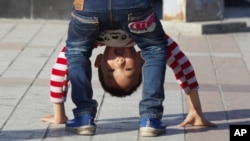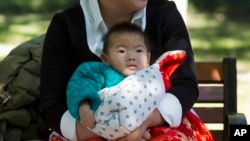China’s decision to completely end the country’s one-child policy after three decades has gone viral online and stirred up a heated debate, with many Chinese complaining that the cost of raising one child is already too much to bear. Some said they would not support the policy, and others noted that the right to choose how many children a couple should have is a personal decision, not one the government or party should be making.
Chinese authorities need the policy change to be a success to compensate for the country’s massive gender divide and a shrinking workforce. China’s population is getting older, and the number of laborers is shrinking dramatically each year. Cultural preferences for boys and the one-child policy has left the country with 30 million more men than women, according to some estimates.
Online, some are griping about how the policy will end benefits for those who only have one child. Others worry that the government will use financial penalties to force couples to have two children, in the same way as family-planning authorities have imposed fines for decades on couples with more than one child.
Resident taunts authorities
One Liaoning resident taunted authorities in a post online, writing: “Before I couldn’t have kids. Now the tables have turned, but I am not going to have a child, damnit! Let’s just see what you can do to fine me for not having a child.”
Fei Fei, a retired teacher and artist, said the government should looking at the issue from the people's viewpoint, because it is not necessary for everything to be decided by the government.
This week's decision came too late for Fei Fei, who says the government acted more in the interest of boosting the workforce than in the public interest.
“I regret it a lot. When I was young - 25 or 27 years old - I wanted to have another child, but it was forbidden. Now I am old; my wife is old. Even if my wife was young, I don’t want to have any more children anymore,” Fei Fei said.
Qi, who recently completed graduate school, is a member of an ethnic minority from Inner Mongolia. She hopes to have more than one child when she marries, but for now, she doesn’t even have a boyfriend. She supports the government's decision, although she also thinks it is unreasonable for the authorities to dictate how many children individuals should have.
“Having children is a right that every individual should have. But since I am living in this country and I do not make the rules, I can do little but follow them. That’s just me,” she said. “I don’t have any right to change the rules. And to live a stable life I don’t have any other option but to abide by the rules,” Qi said.
But that does not mean rules will not be broken. Before the one-child limit was lifted, Qi said, some of her friends chose to pay the government's fines and have a second child.
Refunds due?
Those who already have a second child have been asking online whether the government will refund the fines they’ve already paid. That is unlikely. In fact, Chinese media reports have said that parents who bear a second child before local governments enact legal amendments to adopt the new policy will still be fined.
The Chinese government said Friday that it will allow provinces to work out the details regarding the policies. Some analysts predict the dramatic national policy shift could trigger a backlash, since local governments have long profited from the fines they mete out to enforce the one-child policy.
China began loosening its one-child policy in 2013, allowing a second child for married couples where at least one of the partners was an only child. Few have decided to do that, however, and birth rates in the country’s big cities have remained low.
Mo, a young woman who works in information technology, says she definitely intends to have more than one child. And she adds that such a decision is a purely personal matter that should not be affected by politics.
“When my mother had my brother, he had to have to be born in secret," she said, to avoid fines. "With the new policy, that will no longer need to happen.”
Lin, a student in Beijing who welcomed the change, sees limiting family size was a human rights issue. When he gets married, he says, “If we want to have kids, we won’t just have two. We could have even more. As many as we would like.”





